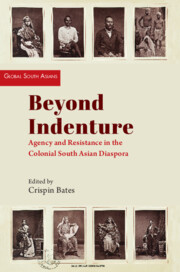Book contents
- Frontmatter
- Dedication
- Contents
- List of Figures and Tables
- Acknowledgements
- Introduction
- I Agency and Resistance
- 1 Negotiating Power in Colonial Natal: Indentured Migrants in Natal, 1860–1911
- 2 Stewed Plums, Baked Porridge and Flavoured Tea: Poisoning by Indian Domestic Servants in Colonial Natal
- 3 Labour Resistance in Indenture Plantations in the Assam Valley
- 4 A Forgotten Narrative of the Satyagraha Campaign: The Treatment of Prisoners between 1907 and 1914
- 5 Toilers across the Seas: Racial Discrimination and Political Assertion among Sikhs in Canada
- II Remigration
- 6 The Remigration of Hindostanis from Surinam to India, 1878–1921
- 7 Not So Anchored: The Remigration of Indians within the Caribbean Region
- 8 On the Move: Remigration in the Indian Ocean, 1850–1906
- III Gender and Family
- 9 Intimate Lives on Rubber Plantations: The Textures of Indian Coolie Relations in British Malaya
- 10 Labouring under the Law: Exploring the Agency of Indian Women under Indenture in Colonial Natal, 1860–1911
- 11 Gujarati ‘Passenger Indians’ in the Eastern Cape since 1900: Business, Mobility, Caste and Community
- 12 The Eurasian Female Workforce and Imperial Britain: Harnessing Domestic Labour by People of Mixed Racial Descent
- IV Legacies
- 13 After the Long March: Colonial-Era ‘Relief’ for Burma Indian Evacuees in Visakhapatnam District, 1942–1948
- 14 Opposing the Group Areas Act and Resisting Forced Displacement in Durban, South Africa
- 15 Indo-Fijians: From Agency to Abjection
- 16 New and Old Diasporas of South South Asia: Sri Lanka and Cyber-Nationalism in Malaysia
- About the Contributors
- Index
2 - Stewed Plums, Baked Porridge and Flavoured Tea: Poisoning by Indian Domestic Servants in Colonial Natal
Published online by Cambridge University Press: 31 December 2023
- Frontmatter
- Dedication
- Contents
- List of Figures and Tables
- Acknowledgements
- Introduction
- I Agency and Resistance
- 1 Negotiating Power in Colonial Natal: Indentured Migrants in Natal, 1860–1911
- 2 Stewed Plums, Baked Porridge and Flavoured Tea: Poisoning by Indian Domestic Servants in Colonial Natal
- 3 Labour Resistance in Indenture Plantations in the Assam Valley
- 4 A Forgotten Narrative of the Satyagraha Campaign: The Treatment of Prisoners between 1907 and 1914
- 5 Toilers across the Seas: Racial Discrimination and Political Assertion among Sikhs in Canada
- II Remigration
- 6 The Remigration of Hindostanis from Surinam to India, 1878–1921
- 7 Not So Anchored: The Remigration of Indians within the Caribbean Region
- 8 On the Move: Remigration in the Indian Ocean, 1850–1906
- III Gender and Family
- 9 Intimate Lives on Rubber Plantations: The Textures of Indian Coolie Relations in British Malaya
- 10 Labouring under the Law: Exploring the Agency of Indian Women under Indenture in Colonial Natal, 1860–1911
- 11 Gujarati ‘Passenger Indians’ in the Eastern Cape since 1900: Business, Mobility, Caste and Community
- 12 The Eurasian Female Workforce and Imperial Britain: Harnessing Domestic Labour by People of Mixed Racial Descent
- IV Legacies
- 13 After the Long March: Colonial-Era ‘Relief’ for Burma Indian Evacuees in Visakhapatnam District, 1942–1948
- 14 Opposing the Group Areas Act and Resisting Forced Displacement in Durban, South Africa
- 15 Indo-Fijians: From Agency to Abjection
- 16 New and Old Diasporas of South South Asia: Sri Lanka and Cyber-Nationalism in Malaysia
- About the Contributors
- Index
Summary
This teapot, whose rage is writ too large to be cooped
within one pygmy chanticleer, surveyed amazed
by gulls and gannets, trumpets his fractious challenged.
Tempting to dub the din thanksgiving; or more; life
triumphs even on no longer trusted planets.
—Douglas Livingstone, ‘Scourings at Station 19’ (1991)Poisoning occupies a special place in the history of crime. It requires a considerable degree of premeditation, and because it often produces very little incriminating evidence and until comparatively recently was virtually undetectable, it was an attractive and favoured method of killing during the late nineteenth and early twentieth centuries. Between 1880 and 1920, 18 high-profile cases of poisoning by Indian domestic servants in Natal were tried before the circuit, district and supreme courts. Due to the clandestine nature of poisoning, the difficulty of detection and the knowledge required for its successful execution, it is likely that this only represents a small proportion of the actual number of attempted poisonings – such is the predilection of historicity and nature of archival sources.
Under the Indian indenture system, approximately 152,184 indentureds voyaged to colonial Natal in the period between 1860 and 1911. Conventional and linear histories of these years have tended to present a static categorisation of Indians in Natal as those who toiled on the sugar plantations along the coastal belt of Natal and non-contracted traders commonly referred to as ‘passenger Indians’. For the most part, indentured Indians were considered by the state and employers to be dispensable components of a capitalist bonded labour system. On the periphery of this indenture–trader dichotomy, Indians also took up positions as railway workers, constables, court messengers, miners, fishermen, fruit and vegetable hawkers, tea pickers, teachers, interpreters and, in this case, domestic servants. The private and personal spaces of colonial society within which domestic servants lived and worked – the settler homes – bore witness to entangling relationships between master and servant that were at times both volatile and tender. This chapter focuses on the crime of ‘administering poison with intent to murder’ and argues that the very act of poisoning manifests as a mode of agency, revenge and resistance by domestic servants against their masters and mistresses. The crime of poisoning in a settler community is rather revealing of the deep levels of anxiety and paranoia that proliferated in Natal’s white community.
- Type
- Chapter
- Information
- Beyond IndentureAgency and Resistance in the Colonial South Asian Diaspora, pp. 38 - 61Publisher: Cambridge University PressPrint publication year: 2024



